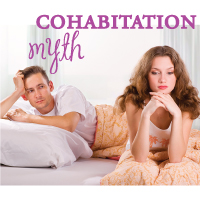Couples on probation!
Why cohabitation doesn’t work
Don’t get us started…there are SO many reasons why cohabitation is a bad idea, we could go on for pages! In this post– we want to focus on one: the probation factor.
In case you’re wondering, the evidence is quite clear: cohabitation doesn’t ‘divorce-proof’ a subsequent marriage – it actually increases its likelihood of breakdown. Numerous studies have demonstrated the link, though the precise amount of risk increase varies due to study parameters including the kind of cohabitation arrangement.
For example, the only group that appears not to be aversely affected by cohabitation are those who begin cohabiting during their engagement, that is, after they have already decided to be permanently committed to each other.
Back to the probation factor!
It’s common practice when a new employee begins work to have a probation period – a defined time where the employer reserves the right to discontinue employment if the employee is unsatisfactory. In our experience, a probation period is a comfort to us as employers but in practice, it usually fails to do what it should: give us the chance to really determine if this person is a good fit for our organisation.
Of course it’s not that great an experience for the employee who can feel insecure in the position – as well they should! The reality is they are being tested.
Typically, when the probation period ends if there have been no real problems, we will formalise a permanent position and mostly it works out really well. But sometimes it doesn’t. When it doesn’t, we ask ourselves: how did we miss it?
It doesn’t take a rocket scientist to work it out: in a probation period, the employee is on their best behaviour. Once the position is permanent the employee relaxes and their default style and their true values become evident. A probation period simply isn’t very effective for identifying disprencancies in values.
Cohabitation as a Probation period
When cohabitation is approached as a ‘trial marriage’, it’s a similar dynamic, except that both are testing the other and assessing whether the other will perform to standard. In these conditions, it’s natural, and indeed wise, to hold back. We put on our most pleasant mask, hide our true nature and avoid bringing up touchy topics or challenging the other too much – after all, we don’t want to risk rejection.
This is not a good way to truly get to know each other.
One could argue that the same applies to the dating couple who is not cohabitating: they also are in a kind of probation period, each testing and wondering if the other is going to be right for them. This is the reality of the dating and courtship process. The point is: cohabitation doesn’t avoid it.
What cohabitation does do, is elongate the courtship period and to habituate the probation mentality of testing the other, so that even when the couple marries, the mentality can persist.
And here’s why cohabitation doesn’t work as a trial marriage or as divorce prevention strategy.
The probation mentality comes hand in hand with a willingness to terminate the relationship if the other fails to meet expectations. While this is appropriate in an employer-employee relationship, it’s not appropriate or helpful in a marriage.
When a couple cohabits before marriage, especially if it is for long periods, it desensitises them to divorce because they have previously been living together with the possibility of breakup lurking in the background. It’s an extension of the consumer mentality that, instead of mending a broken item, tends to discard it and start again.
The longer a couple cohabits, the more entrenched the probation mentality is likely to be.
This is not to say that every couple who cohabits before marriage will divorce; we’re talking about increased risk. For some couples, that will manifest as a painful divorce. For others, it will just make marriage that litte bit harder and many do manage to overcome any negative effects of cohabitation. The point is, it will almost certainly never make it easier.
So here’s our advice.
If you want to maximise the chance of success in your future marriage (and who doesn’t?), the old fashioned way of an intense and focussed courtship, without cohabitation, is still the superior way to do it!




